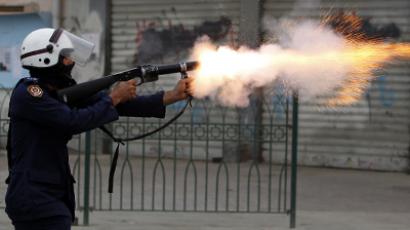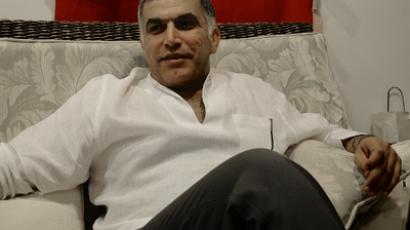Bahrain meets 2013 with intensified crackdown on protesters
Bahrain has rung in 2013 with newly invigorated popular unrest, as Shiite protesters took to the streets demanding a new transitional government to replace that of Prime Minister Khalifa, who has ruled the tiny Gulf state for more than 40 years.
The violence follows similar clashes earlier in the week when one man suffered a severe head injury when the government used force against protesters in the capital, Manama. Tear gas was deployed by the Saudi-backed state's law enforcement to disperse the protesters, who demanded freedom for all jailed activists. On Monday, several protests were detained across the island nation. The Shiite opposition in the tiny Sunni-ruled kingdom, which is home to the US Navy's fifth fleet, wants a government of technocrats to rule during a transition that would lead to a constitutional monarchy.But the clampdown on the opposition is intensifying, according to Asma Darwish of the European-Bahraini Organisation for Human Rights.“Yesterday was just the beginning of the year, and we could see the excessive use of violence and no actual intention of the authorities to enhance the situation or to have a real political reform on the ground in Bahrain,” Darwish told RT.“Security forces are using a lot of violence and are violating many human rights during the confrontations with pro-democracy protesters.”Since the uprising began in February 2011, at least 80 people have been killed and thousands arrested. A report published by the Bahrain Independent Commission of Inquiry in November 2011 found that political activists, politicians and protesters had been tortured. It also rejected government claims that the uprising was instigated by Iran.A followup unit sent in June 2012 to monitor Bahrain's progress in implementing the report’s recommendations found that human rights activists were still being arrested and harassed - and at increasing rates. “The promise of meaningful reform has been betrayed by the government’s unwillingness to implement key recommendations around accountability,” the group reported, adding that the situation in Bahrain has “markedly deteriorated” and the country “risks sliding into protracted unrest and instability.”Last month the government banned rallies and stripped 31 opposition members of their nationality for what it said were security reasons. Since December, the Financial Times reports that one village was raided by police more than 300 times, with some houses plundered several times a day.Such scenes are becoming an everyday reality for locals, Darwish says, adding that in the village of Sitra, where she lives, “tear gas was excessively used by security forces” as they “ran down the streets and randomly terrorized the houses either by shooting at them with guns or by manually throwing tear gas canisters into the houses.”














